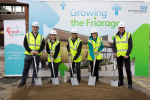All of us who have fought hard for the best possible range of services at the Friarage Hospital in Northallerton will be delighted by the decision of local health chiefs to maintain the 24/7 opening hours of the hospital’s urgent treatment centre (UTC).
At a time when our NHS heroes are the front line of the battle against the coronavirus, it is fantastic news to hear that the hospital services we particularly value in our very rural part of the country are to be protected.
During the five years I have been your MP I have consistently argued that the Friarage is a special hospital because of the huge area it serves. While welcome advances in medical practice and shortages of some types of doctors tend to encourage the delivery of services in big regional hubs, patients’ distance from centres like the James Cook University Hospital in Middlesbrough means there has to be an important role for small rural hospitals like the Friarage.
This week’s decision is an acknowledgment of that vital role. Reduced opening hours for the Friarage UTC would have meant patients travelling from Hawes in the middle of the night in mid-winter to the nearest emergency treatment available in Middlesbrough or Darlington.
I also believe the decision marks a turning point in the fortunes of the hospital.
We now have new management at the South Tees Hospitals NHS Foundation Trust – the body which runs the Friarage – committed to developing services at Northallerton, taking full advantage of the great skills and commitment of the workforce there and taking pressure off the James Cook site which many of you will be aware is fully utilised.
There will be more elective (planned) procedures and operations, developments in ophthalmology and of course we also have the new cancer treatment centre.
Doctors are now being trained again at the Friarage – a move which followed my successful efforts to double the number of local doctor training places. That’s really important in attracting doctors to careers at the Friarage and the hospital’s long-term future.
The difficulty in recruiting the specialist doctors required to run a safe A&E department is why, of course, it had to be replaced by the UTC.
The independent healthcare consultants’ report I commissioned demonstrated very clearly that those difficulties were real and not likely to be resolved in the short term.
Further, that report praised the innovative nature of the Friarage UTC – a model for a small rural hospital – and prompted Simon Stevens, the overall boss of NHS England, to accept my invitation to see it in action at the end of last year.
Finally, I want to pay tribute to the two doctors – Adrian Clements and James Dunbar – and their colleagues for devising our class-leading UTC. Those of you who were among the hundreds who attended my public meeting about the hospital’s emergency services last year will recall the passion and commitment they demonstrated in explaining the hospital’s situation and how their plan would mean the vast majority of patients would receive their urgent care at the Friarage.
With this period of uncertainty over - and when our brilliant NHS staff have won the battle with the virus - we can look forward to a brighter future for the Friarage.

